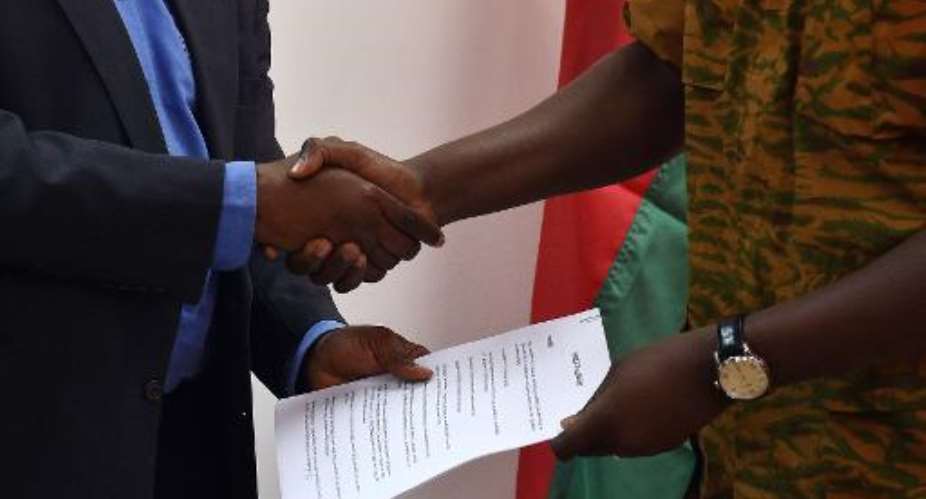Ouagadougou (AFP) - The signing of Burkina Faso's transitional agreement to return the west African nation to civilian rule has been pushed back by a day for "technical" reasons, a military source said.
The country's army, political parties and civil groups were on Saturday due to sign the agreement, which lays out the steps to a one-year transfer of power from the military, which took over after mass protests forced out veteran president Blaise Compaore on October 31.
But the ceremony has been postponed because the building where the document was to be signed was still being repaired after damage from the demonstrations and because traditional leaders from the regions invited to the ceremony needed more time to travel to the capital, the source said on condition of anonymity.
"The signing of the charter has thus been pushed back to Sunday" at 4:00 pm (1600 GMT), the source said. "We want to brief our traditional leaders on our discussions."
The transition charter, akin to an interim constitution, lays out a one-year transition to civilian rule that includes appointing a temporary president and calls for elections by November 2015.
Delicate negotiations had already begun on Friday in Burkina Faso's capital city Ouagadougou over who the country's next leaders will be, including the president, the head of the interim parliament and the prime minister.
Under the deal, an interim civilian president will be chosen by a special electoral college.
The president will in turn appoint a prime minister, either a civilian or a military figure, who will head a 25-member transitional government.
A civilian will also head a 90-seat parliament, known as the National Transitional Council.
Opposition parties, civil groups, religious leaders and the military hammered out the transition pact during intense talks and unanimously voted in favour of the roadmap on Thursday.
Burkina Faso's military has faced mounting international pressure to transfer power to an interim government.
Compaore quit under pressure amid protests sparked by his bid to extend his 27-year rule by changing the constitution of the landlocked former French colony of some 17 million people.





 Prince Harry, Meghan visit Nigeria
Prince Harry, Meghan visit Nigeria
 Ghana’s electoral commission is one that trusts thieves — Omane Boamah
Ghana’s electoral commission is one that trusts thieves — Omane Boamah
 All government cares about is spending more and more money on itself — Dalex Fin...
All government cares about is spending more and more money on itself — Dalex Fin...
 COVID-19: GHS records 57% vaccination coverage
COVID-19: GHS records 57% vaccination coverage
 My government will support churches – Bawumia assures Clergy
My government will support churches – Bawumia assures Clergy
 Mahama, Bawumia and Alan have flatly failed Ghanaians – Kofi Akpaloo
Mahama, Bawumia and Alan have flatly failed Ghanaians – Kofi Akpaloo
 PAC warns public institutions to comply with the Public Procurement Act
PAC warns public institutions to comply with the Public Procurement Act
 Voter registration: NDC slams EC’s refusal to share serial numbers of BVR kits
Voter registration: NDC slams EC’s refusal to share serial numbers of BVR kits
 Akufo-Addo's 'corrupt, yenkyendi cronyism' cost Ghana $190m stake in US Millenni...
Akufo-Addo's 'corrupt, yenkyendi cronyism' cost Ghana $190m stake in US Millenni...
 Don't be 'conduit' to President Akufo-Addo's 'I can't hand over power to Mahama'...
Don't be 'conduit' to President Akufo-Addo's 'I can't hand over power to Mahama'...
